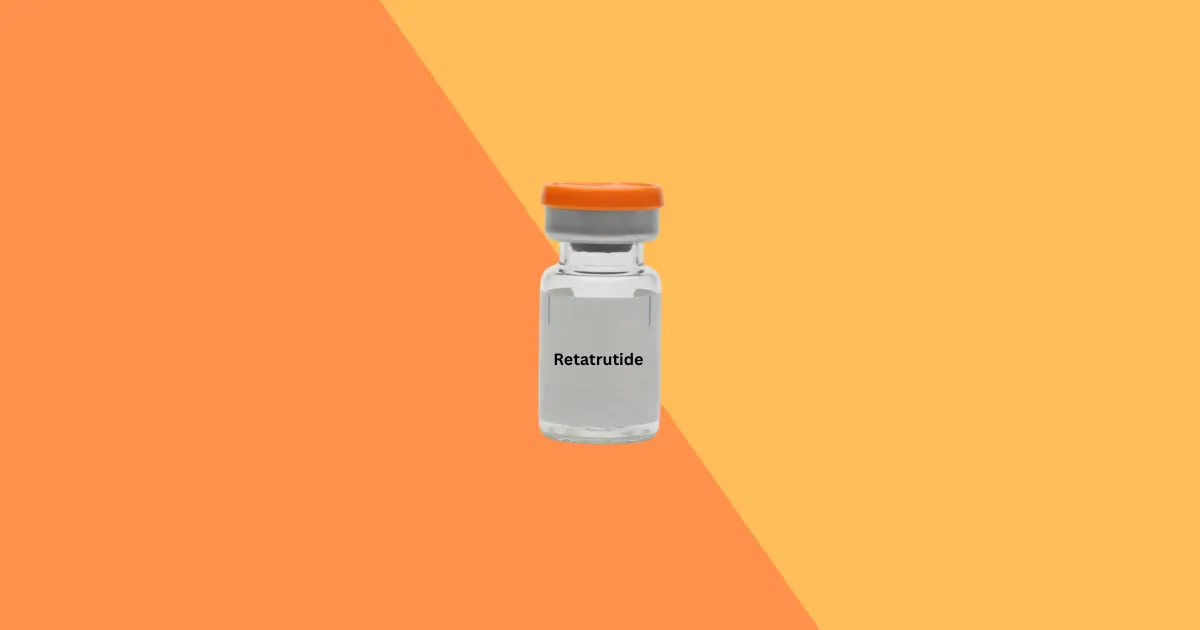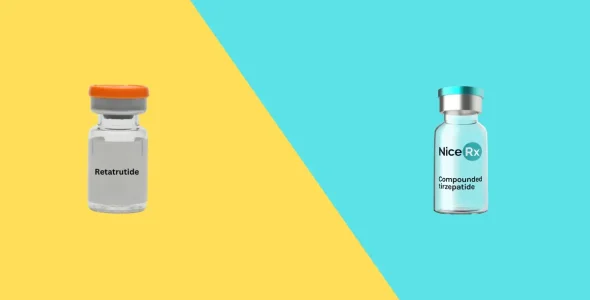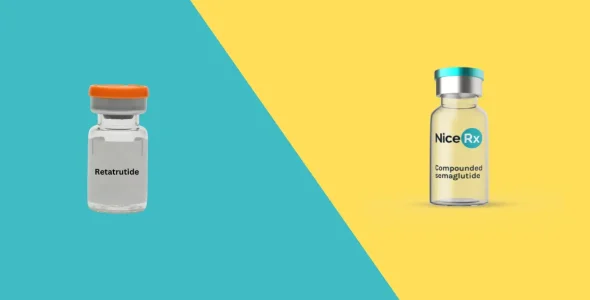Retatrutide: The triple-action peptide revolutionizing weight loss
Retatrutide—the groundbreaking triple-action peptide revolutionizing weight loss and glucose control. Could this be the ultimate solution for obesity and diabetes?
Key highlights
- Retatrutide is a peptide weight loss medication with a triple mechanism of action. It acts as an agonist at GLP-1, GIP, and glucagon receptors.
- The synergetic effect of the activation of these receptors enhances insulin release, dissolves fats, suppresses appetite, and lowers blood sugar levels.
- Phase 2 clinical trials showed that participants using retatrutide lost 17.5% of their weight after 24 weeks and 24.2% after 48 weeks.
- The TRIUMPH phase 3 development program is testing the medication for obstructive sleep apnea, chronic weight loss, and knee osteoarthritis.
- The most common side effects of retatrutide are nausea, vomiting, diarrhea, abdominal discomfort, and constipation. The serious side effects are allergic reactions, pancreatitis, hypoglycemia, and severe gastrointestinal problems.
- Retatrutide has not yet been approved by the FDA. It is currently in Phase 3 trials and is expected to be commercially available in late 2026 or 2027.
Retatrutide is emerging as a novel peptide-based weight loss medication with a unique triple-action mechanism. It acts as an agonist at glucagon-like peptide-1 receptors, glucose-dependent insulinotropic hormone receptors, and glucagon receptors. The synergetic effect of activating these receptors simultaneously promotes insulin release and fat breakdown, reduces hunger pangs, suppresses appetite, and maintains blood sugar levels.
Retatrutide is expected to be a blockbuster due to its potential to revolutionize weight loss treatment. The medication is not FDA-approved yet and is currently in phase 3 clinical trials.
This article provides a comprehensive overview of retatrutide and explores the science behind it including its mechanism of action, potential benefits for weight loss and metabolic health, clinical trial data, and future implications.
What is retatrutide?
Retatrutide is a single peptide with 39 amino acids conjugated to a lipid diacid molecule. The medication acts as a triple hormone receptor agonist at glucagon-like peptide-1 receptors, glucose-dependent insulinotropic polypeptide receptors, and glucagon receptors. It suppresses appetite, stimulates insulin release, and promotes fat breakdown in the body.
Semaglutide (Ozempic, Wegovy, and Rybelsus) is a GLP-1 receptor agonist that promotes weight loss and blood sugar control by occupying glucagon-like peptide-1 receptors. Tirzepatide (Mounjaro and Zepbound) is a dual agonist at GLP-1 and GIP receptors. In comparison, retatrutide also occupies glucagon receptors (GCGR), along with GLP-1 (GLP-1R) and GIP receptors (GIPR). The synergetic effect of activating these three receptors makes the medication highly effective for weight reduction.
The U.S. Food and Drug Administration (FDA) has not approved the medication yet. It is still in phase 3 clinical trials.
Retatrutide’s triple mechanism of action: The science behind it
The combined activation of these three receptors promotes weight loss and metabolic control more efficiently than other medications.
Retatrutide works in the following ways to exert its action:
GLP-1 receptor agonism
The activation of GLP-1 receptors has the following effects:
- It increases insulin secretion from the beta cells of the pancreas, which helps lower blood sugar levels.
- It reduces glucagon secretion from the alpha cells of the pancreas, which decreases the production of glucose from the liver.
- These receptors slow down the rate of gastric emptying by relaxing stomach muscles. The food stays in your stomach for a longer time, which reduces hunger cravings.
- It impacts the hunger control centre of the brain (lateral hypothalamus) to reduce appetite and increase satiety.
GIP receptor agonism
When an agonist activates GIP receptors, it enhances insulin secretion and increases glucose reuptake. These actions lower blood glucose levels, contributing to weight management and type 2 diabetes management.
Glucagon receptor agonism
Glucagon receptor activation increases energy expenditure, improves liver health, delays gastric emptying, and promotes fat breakdown. In the liver, retatrutide has similar efficacy to naturally occurring glucagon in evoking glucose production. However, in adipose tissues, its ability to induce lipolysis surpasses that of the native glucose-dependent insulinotropic hormone.
Retatrutide for weight loss: Clinical trial evidence
The phase 1 clinical trials of retatrutide involved 72 individuals with diagnosed type 2 diabetes. They received 12 mg once weekly retatrutide injections subcutaneously for 12 weeks. The retatrutide group showed an average weight loss of 8.96 kg (or 10% of their body weight). HbA1c reduced by -1.2%. Patients showed elevated levels of insulin and a decrease in systolic blood pressure. The levels of low-density lipoprotein cholesterol, very low-density lipoprotein cholesterol, and triglycerides were also decreased compared to placebo, which did not improve lipid profile.
The phase 2 clinical trial was conducted in the U.S. and involved 281 participants. They were randomly assigned to receive either a placebo, different doses of retatrutide, or 1.5 mg dulaglutide through weekly injections. The results showed the greatest weight loss in the 4 mg and higher doses of retatrutide compared to the placebo and 1.5 mg dulaglutide. The patients who received the 12 mg retatrutide group showed a -2.02% decrease in HbA1c levels, compared to -0.01% in the control group. Additionally, retatrutide improved insulin sensitivity and reduced liver enzymes ALT and AST after 36 weeks.
A phase 2 clinical trial published in The New England Journal of Medicine enrolled 338 patients with a body-mass index of 30 or higher or those with a BMI of 27 to less than 30 with at least one weight-related condition. The patients received 1 mg, 4 mg, 8 mg, and 12 mg of retatrutide once weekly for 48 weeks compared to placebo. On average, the patients lost 17.5% of their body weight at 24 weeks and 24.2% of weight after 48 weeks.
The following body weight changes were observed with different doses of the medication:
| Group | Body weight change at 24 weeks (%) | Body weight change at 48 weeks (%) | 5% or more weight reduction at 48 weeks (%) | 10% or more weight reduction at 48 weeks (%) | 15% or more weight reduction at 48 weeks (%) | Changes in BMI |
|---|---|---|---|---|---|---|
| Placebo | -1.6 | -2.1 | 27% | 9% | 2% | −0.7 |
| 1 mg | -7.2 | -8.7 | 64% | 27% | 16% | −3.2 |
| 4 mg | -12.9 | -17.1 | 92% | 75% | 60% | −6.7 |
| 8 mg | -17.3 | -22.8 | 100% | 91% | 75% | −9.0 |
| 12 mg | -17.5 | -24.2 | 100% | 93% | 83% | −9.1 |
Retatrutide benefits beyond weight loss: Exploring other potential benefits
The same phase 2 clinical trials demonstrate that retatrutide also improved the cardiometabolic profiles of patients. These changes include the following:
- Decreased levels of HbA1c levels
- Improved fasting glucose levels
- Improved insulin levels
- Reduced levels of LDL, triglyceride, and cholesterol
- After 48 weeks, 72% of prediabetic patients reverted to normoglycemia (normal blood sugar levels) as compared to 22% of participants in the placebo group.
- Additionally, 41% of patients who used 8 mg retatrutide showed an improvement in blood pressure, and they had to discontinue at least one antihypertensive medication.
These results show that retatrutide is effective in the management of type 2 diabetes and reduces the risk of cardiovascular disease.
Ongoing phase 3 trials are studying the medication for:
- Type 2 diabetes
- Weight management
- Osteoarthritis
- Non-alcoholic fatty liver disease (NAFLD)
- Obstructive sleep apnea in obese and overweight adults.
Retatrutide safety and side effects
The Phase 2 clinical trial results showed an incidence of adverse events in 70% of patients in the placebo group and 73 to 94% in the retatrutide group. Adverse effects were more common at high doses of the medication (8 mg and 12 mg once weekly). Mild side effects such as nausea, vomiting, diarrhea, and constipation were more frequent in the retatrutide group. However, these gastrointestinal side effects were observed during dosage escalation. There were minimal side effects at lower doses.
The common side effects of retatrutide are:
- Nausea
- Vomiting
- Diarrhea
- Constipation
- Fatigue
- Abdominal discomfort
- Early satiety
- Injection site reactions
- Increased heart rate
Serious side effects of the medication include the following:
- Allergic or hypersensitivity reaction
- Liver problems
- Severe gastrointestinal issues
- Major depressive disorder
- Suicidal ideal
- Changes in mood and behavior
- Pancreatitis
- Low blood sugar levels (hypoglycemia)
- Cardiac arrhythmias
The drug is still not FDA-approved and contraindications have not yet been determined. Generally, retatrutide is not suitable for breastfeeding and pregnant females and children.
As most side effects occur during dose escalation, it is important to increase the dosage slowly according to the dosing schedule. Do not increase the dosage too quickly, and do not start the medication with higher doses. Consult your healthcare provider for dose adjustments. In case of allergic reaction or hypoglycemia, immediately visit the nearby healthcare facility to seek emergency care.
Retatrutide dosage and administration
The starting dosage of retatrutide is 1 mg once weekly for the first 4 weeks. The dosage is escalated every four weeks, according to the patient’s tolerance.
If the patient cannot tolerate a higher dose, the dose escalation is delayed for four weeks.
The typical dosing schedule of the medication is as follows:
- 1 mg once weekly for the first 4 weeks
- 2 mg once weekly for the next 4 weeks
- 4 mg once weekly for the next 4 weeks if tolerated by the patient
- 8 mg once weekly for the next 4 weeks if tolerated by the patient
- 12 mg once weekly if tolerated by the patient, which is the maximum dosage.
Retatrutide injection is administered subcutaneously (under the skin, just above your muscles). Always clean the injection site before injecting the medication to reduce the risk of injection site infections.
Retatrutide availability
Retatrutide is currently under clinical trials and has not yet received FDA approval. It is more likely to be available in the upcoming years, by 2026 or 2027. The manufacturer, Eli Lilly, is enrolling patients with type 2 diabetes to compare the effect of retatrutide with semaglutide in adult patients with type 2 diabetes and poor glycemic control with metformin and with or without SGLT2 inhibitors.
The TRIUMPH phase 3 development program is testing the efficacy of retatrutide of retatrutide for obstructive sleep apnea, weight management, and knee osteoarthritis in obese and overweight patients. Currently, the core registration studies to assess the efficacy of retatrutide include:
- TRIUMPH-1: A randomized, double-blind, placebo-controlled trial to test the safety and effectiveness of a treatment for people with obesity or overweight, including those with OSA and OA, but without type 2 diabetes.
- TRIUMPH-2: This study investigates the safety and effectiveness of a treatment for people with obesity or overweight and type 2 diabetes, including those with OSA.
- TRIUMPH-3: Designed to test the safety and effectiveness of a treatment for people with Class II or III obesity and cardiovascular disease.
- TRIUMPH-4: Focuses on the safety and effectiveness of a treatment for individuals with obesity or overweight and OA.
How retatrutide compares to other peptide therapies
A clinical study compared the therapeutic efficacy of liraglutide, retatrutide and tirzepatide in the treatment of diabetic kidney disease in mice. Retatrutide and tirzepatide had superior efficacy in improving diabetic kidney disease, blood sugar control, and body weight management. Retatrutide was most effective in managing diabetic kidney disease and body weight. Meanwhile, tirzepatide was most effective in blood glucose management.
In phase 3 clinical trials, Novo Nordisk’s semaglutide showed an average weight loss of 10-15% of body weight when the medication was used for 68 weeks. Tirzepatide reduced body weight by 16%, 21.4%, and 22.5% on 5 mg, 10 mg, and 15 mg (once weekly injections), respectively, after 72 weeks.
In comparison, the patients lost 17.5% of their body weight on average at 24 weeks and 24.2% of weight after 48 weeks in phase 2 clinical trials with retatrutide.
These statistics show that retatrutide may have greater efficacy than tirzepatide and semaglutide due to its unique triple hormone receptor agonist mechanism of action. More research studies are still needed to assess the efficacy of retatrutide in the treatment of obesity and type 2 diabetes.
RELATED: Retatrutide vs. semaglutide, Retatrutide vs tirzepatide
Who can benefit from retatrutide?
You can benefit from retatrutide therapy if:
- You are obese (BMI 30 kg/m² or more) or overweight (BMI 27 kg/m² or more) with at least one weight-related health condition.
- You have type 2 diabetes or metabolic syndrome.
- You have not achieved the desired results with other weight loss medications.
Always consult with your doctor before starting weight loss medications. They will thoroughly assess your medical history and health goals to create a customized treatment plan for you.
The future of retatrutide peptide
The therapeutic applications of retatrutide are beyond just weight loss and diabetes management. Ongoing research studies are testing the medication for obstructive sleep apnea (OSA), knee osteoarthritis (OA), non-alcoholic fatty liver disease (NAFLD), and cardiovascular risk reduction.
According to phase 2 clinical trials, retatrutide has the potential to improve cardiometabolic health, reduce cholesterol, triglyceride, and LDL, and promote fat breakdown. Patients showed improved liver function, enhanced insulin levels, and optimal blood sugar levels. Systolic blood pressure was also decreased. These findings show that retatrutide has the potential to reduce the risk of cardiovascular events and improve overall metabolic health.
Retatrutide frequently asked questions (FAQs)
What makes retatrutide different from other peptides?
Retatrutide is a triple-action peptide that acts as an agonist at GLP-1, GIP, and glucagon receptors compared to other peptides. Semaglutide is a GLP-1 receptor agonist, and tirzepatide is a dual agonist at GLP-1 and GIP receptors. The activation of three receptors simultaneously makes retatrutide highly effective for blood sugar control, weight loss, and appetite suppression.
When will retatrutide be available to the public?
Retatrutide will be available to the public after its FDA approval. Currently, the medication is under rigorous testing and review. The TRIUMPH phase 3 development program is testing the efficacy of retatrutide for obstructive sleep apnea (OSA), osteoarthritis, and weight management. It may take a year or two for retatrutide to be approved by the FDA and become available in the markets. The manufacturer (Eli Lilly) has not yet provided an estimated timeline. It is expected to be in the market by 2026 or 2027.
Is retatrutide safe for long-term use?
The participants of the phase 2 trial used the medication for 48 weeks. The medication was safe, with mild to moderate manageable side effects. These side effects were observed during dose escalation and subsided with lowering the dosage of retatrutide. However, further research is still needed to confirm whether retatrutide is safe for long-term use.
What is the brand name of retatrutide?
Retatrutide does not have a brand name yet. The medication is an experimental medication produced by Eli Lilly. It will have a brand name after FDA approval.
Can retatrutide be used by non-diabetic individuals?
Yes, retatrutide can be used by non-diabetic individuals. The medication is effective for weight management, cardiovascular risk reduction, non-alcoholic fatty liver disease, osteoarthritis, and obstructive sleep apnea (OSA) related to obesity and overweight. Ongoing clinical trials are testing the medication to investigate its effectiveness in managing different weight-related health conditions.
Bottom line
Retatrutide is a triple-action peptide, emerging as a new weight loss medication with greater efficacy than existing medications. It acts as an agonist at GLP-1, GIP, and glucagon receptors to suppress appetite, delay gastric emptying, promote insulin release, and break down fats.
Ongoing phase 3 clinical trials are testing the medication for weight management, osteoarthritis, NAFLD, cardiovascular risk reduction, type 2 diabetes, and moderate to severe obstructive sleep apnea in obese and overweight patients.
Currently, retatrutide has not been approved by the FDA as it is still in clinical phase 3 trials. The medication is expected to be a blockbuster due to its triple agonism and greater efficacy than tirzepatide and semaglutide. It is expected to be commercially available by 2026 or 2027, after the FDA approves the medication.



